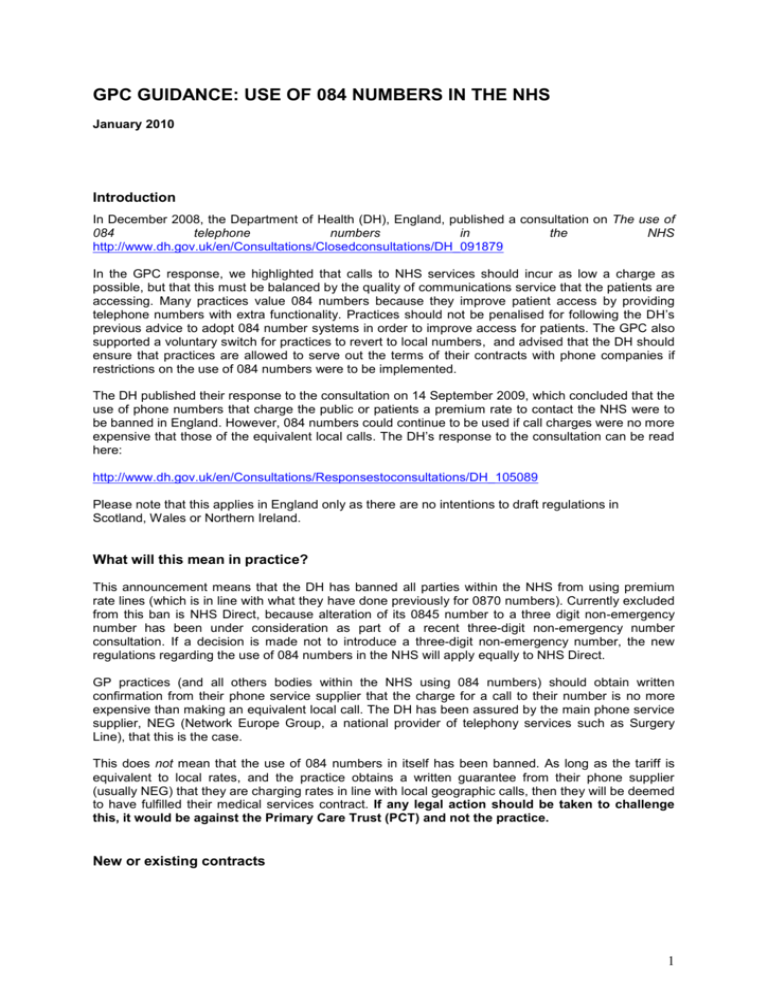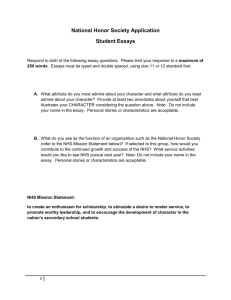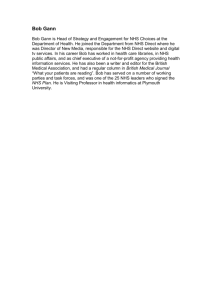084 numbers guidance (draft)
advertisement

GPC GUIDANCE: USE OF 084 NUMBERS IN THE NHS January 2010 Introduction In December 2008, the Department of Health (DH), England, published a consultation on The use of 084 telephone numbers in the NHS http://www.dh.gov.uk/en/Consultations/Closedconsultations/DH_091879 In the GPC response, we highlighted that calls to NHS services should incur as low a charge as possible, but that this must be balanced by the quality of communications service that the patients are accessing. Many practices value 084 numbers because they improve patient access by providing telephone numbers with extra functionality. Practices should not be penalised for following the DH’s previous advice to adopt 084 number systems in order to improve access for patients. The GPC also supported a voluntary switch for practices to revert to local numbers, and advised that the DH should ensure that practices are allowed to serve out the terms of their contracts with phone companies if restrictions on the use of 084 numbers were to be implemented. The DH published their response to the consultation on 14 September 2009, which concluded that the use of phone numbers that charge the public or patients a premium rate to contact the NHS were to be banned in England. However, 084 numbers could continue to be used if call charges were no more expensive that those of the equivalent local calls. The DH’s response to the consultation can be read here: http://www.dh.gov.uk/en/Consultations/Responsestoconsultations/DH_105089 Please note that this applies in England only as there are no intentions to draft regulations in Scotland, Wales or Northern Ireland. What will this mean in practice? This announcement means that the DH has banned all parties within the NHS from using premium rate lines (which is in line with what they have done previously for 0870 numbers). Currently excluded from this ban is NHS Direct, because alteration of its 0845 number to a three digit non-emergency number has been under consideration as part of a recent three-digit non-emergency number consultation. If a decision is made not to introduce a three-digit non-emergency number, the new regulations regarding the use of 084 numbers in the NHS will apply equally to NHS Direct. GP practices (and all others bodies within the NHS using 084 numbers) should obtain written confirmation from their phone service supplier that the charge for a call to their number is no more expensive than making an equivalent local call. The DH has been assured by the main phone service supplier, NEG (Network Europe Group, a national provider of telephony services such as Surgery Line), that this is the case. This does not mean that the use of 084 numbers in itself has been banned. As long as the tariff is equivalent to local rates, and the practice obtains a written guarantee from their phone supplier (usually NEG) that they are charging rates in line with local geographic calls, then they will be deemed to have fulfilled their medical services contract. If any legal action should be taken to challenge this, it would be against the Primary Care Trust (PCT) and not the practice. New or existing contracts 1 Practices entering in to new telecommunications contracts would normally be expected to have a clause inserted to allow them to cancel the contract if the company is not using an appropriate call tariff. However, the DH has been unable to persuade NEG to insert such a penalty-free get-out clause into existing contracts. If a practice is tied into a contract which does not comply with the new regulations, it must remain with its telecommunications supplier until the contract terminates. Thereafter, it will be obliged either to ask for a revised contract from the same supplier, which complies with the new regulations, or to find another supplier. When signing a new contract, the GPC’s legal advice is that practices must ensure that there are flexible (i.e. 1-3 months’ notice period), penalty-free cancellation clauses in the contract. From 21 December 2009, when the legislative changes were made, PCTs and practices have been expected to review the contractual arrangements with their telephone provider annually. This should take the form of obtaining a written guarantee from the telecommunications supplier about call charges. Note that revenue sharing (this is where the supplier of the 084 line receives a proportion of the call charge as well as the caller's telephone line supplier) has not been banned by the Government. Glossary of the terms used in this guidance 01, 02 numbers – See ‘Geographic numbers’. 03 numbers - These numbers were introduced to replace 0870 numbers. Calls to 03 numbers cost the same as those to Geographic numbers for landline and mobile phone users. Revenue sharing is not allowed with 03 number services. 084 numbers – Telephone numbers beginning ‘084’, which often offer extra functionality (such as call routing and queuing), but cost more for callers to call – up to 5p per minute for callers from landlines, and up to 40p per minute for callers from mobile phones. Part of the cost of the call is paid to the call recipient (i.e. revenue sharing). 0870 numbers –The cost of calling an 0870 number is usually higher than the cost of calling a geographic 01 or 02 number, especially for mobile phone users. Revenue sharing on 0870 numbers was ended by Ofcom in February 2008. 0870 numbers were used by businesses and services. Extra functionality – Extra functions such as call routing, queuing, automated appointment alterations, provided by the phone system. Geographic numbers - Local Area Code Numbers (also called UK Town Numbers or STD Codes) all begin with the digits 01 or 02 and relate to a specific area of the UK. Calls to such numbers will usually be charged at a low rate for both landline and mobile phone users. Local numbers – Telephone numbers with the same area dialling code as that of the local area. Calls between local numbers are usually low cost. Calls from mobile phones to local numbers are usually included in users’ calling plans or are of low cost. May also refer to ‘Geographic numbers’. Premium rate numbers - Connect the callers to a service, for which prices far higher than those of a normal (geographical) call are charged. Part of the call charge is paid to the service provider, thus enabling businesses to be funded via the calls. Revenue sharing – Calls to numbers which operate revenue sharing will generate income for both the telephony provider and the recipient of the call. As a result, charges for calls to such numbers are higher than the cost of calling a geographical number. 2 Frequently Asked Questions When will the ban take effect and how will it be enforced? The ban came into force on 21 December 2009 when the Directions to NHS bodies concerning the cost of telephone calls in relation to health services 2009, were issued: http://www.dh.gov.uk/en/Publicationsandstatistics/Legislation/Directionsfromthesecretaryofstate/DH_1 10480 The Directions mirror the proposed amendments to the GP contract regulations and the GPC was consulted on both the Directions and the amendments to the GP contract. The DH expects NHS organisations to adhere to its position on this issue – patients should not be expected to pay more than the equivalent cost of calling a geographical number. Why hasn’t a blanket ban been issued on 084 numbers in the same way as with 087 numbers? Banning 084 numbers outright won’t necessarily solve the issue that some patients are paying more than the cost of calling a normal geographical number to contact the NHS. The ban on 087 numbers demonstrated that banning a specific number range simply leads to the use of other number ranges, which generate similar problems and result in presentation of the same issues yet again. The current ban prevents the use of any number, now and in the future, which costs the patient more to call the surgery than the cost of calling a geographical number. What do practices have to do to prepare? Practices must carry out a review, checking their telecommunications supplier contract to ensure that their supplier offers telephone call rates in line with local charges. NEG, who hold most of these contracts, have assured the Government that they can offer their customers such a guarantee. Can practices sign up to new contracts before the ban comes into effect? As part of the legislative changes, all NHS organisations (including GP practices) will be required to review their current telephony arrangements. Where it is found that the cost of calling the practice is not comparable to calling a normal geographical number, all ‘reasonable steps’ must be taken to rectify this. For example, where calls to the practice are charged at a rate that is more than the equivalent of a call to a geographical number, the practice might seek to vary or renegotiate the terms of its existing contract, terminate its existing contract, or offer a call-back service to patients who do not wish to use a premium rate number to contact it. Should GPs terminate their contracts with existing providers? Existing contracts do not need to be terminated, but where there is evidence that callers are being charged more than the geographical call rate, then GPs are expected to take all reasonable steps to prevent this from happening. Whilst terminating their telephony contract is an option open to GPs, practices can also consider varying or renegotiating the terms of their contract or providing a call-back facility for patients who don’t want to pay a premium rate. What does this mean for GPs tied into long-term contracts? Unfortunately the Government was unable to persuade NEG to add a clause into existing contracts to allow NHS organisations an early release without penalty, but practices should ensure that any new contracts they enter into do include such a clause. However, if a patient wishes to make a complaint about the cost of calling the practice, they should make the complaint against the PCT, not the practice. Should legal costs be incurred, the PCT would be liable. 3 What if the phone company tries to get a practice to sign to a 5-year contract? We would not recommend signing up to long-term contracts. The practice would also need to ensure that calls to its number do not cost more than calls to a geographical number. The practice should ask its supplier for written confirmation of this, and check that there are cancellation clauses in the new contract that are flexible and do not incur a penalty if the telephony provider cannot fulfil its obligations under the Directions. What will happen if costs are disputed? Both parties in a dispute should be able to provide clear evidence that calls to 084 numbers are either more or less expensive than an equivalent call to a normal geographical number. Where there is evidence that calls are more expensive, the NHS body is expected to take reasonable steps to address this according to paragraph 2(3) of the Directions. Will practices that move away from 084 (and similar) numbers miss out on the added functionality that these numbers can provide? No. Telecommunications solutions are available to rent or purchase which operate with 01, 02 or 03 telephone number schemes. These solutions can streamline calls, queue calls and provide automated appointment handling so that patients can call 24 hours a day to book, amend or cancel appointments. Why can’t practices just move to 03 numbers? The DH has stated that it does not wish to micro-manage the contracts that general practices hold with telephony providers, and has left it for GPs to decide which number is most suitable to use for callers to contact their practices, providing that calls to such numbers do not incur higher charges than geographical number calls. The DH’s intention is to set clear guidelines, via the introduction of new legislation. Why can’t GPs themselves decide what phone systems they use? The provision of telephone services for patients and the public is a matter for the local NHS. However, the DH issued guidance in 2006 asking PCTs to ‘ensure that patients telephoning practices do not pay more than they would if they called a local geographical telephone number’1. After learning that in some cases this guidance was still not being implemented, it was felt necessary to amend legislation in order to address the issue effectively. Will patients who call their practice from a mobile phone still pay more? The new legislation will mean that if patients call a practice using their mobile phones, they will be charged no more than if they had called a normal geographical number from their mobile phone. In terms of call tariffs, the call rates which patients are charged depend on their mobile phone service provider. It is a matter for individual members of the public to ensure that they are happy with the terms and conditions of the mobile phone arrangements that they enter into with their mobile phone provider. Do practices have to provide information about their telephone system and rates under the Freedom of Information Act (FoIA)? Yes, practices are obliged to reply to such a FoIA request. It is likely that other practices would receive similar requests, so the Local Medical Committee should co-ordinate replies so that all practices provide a consistent message. In the FoIA reply, it should be highlighted that when all costs are taken into account, the practice does not gain financially from ‘revenue sharing’, and that provision of an 084 telephone line service may even cost the practice more that that of a standard 1 http://www.dh.gov.uk/prod_consum_dh/groups/dh_digitalassets/documents/digitalasset/dh_064288.pdf 4 phone system. Practices can also ask their supplier to provide the information necessary to demonstrate that their call charges are in line with geographic call charges, as required by the new legislation. 5







